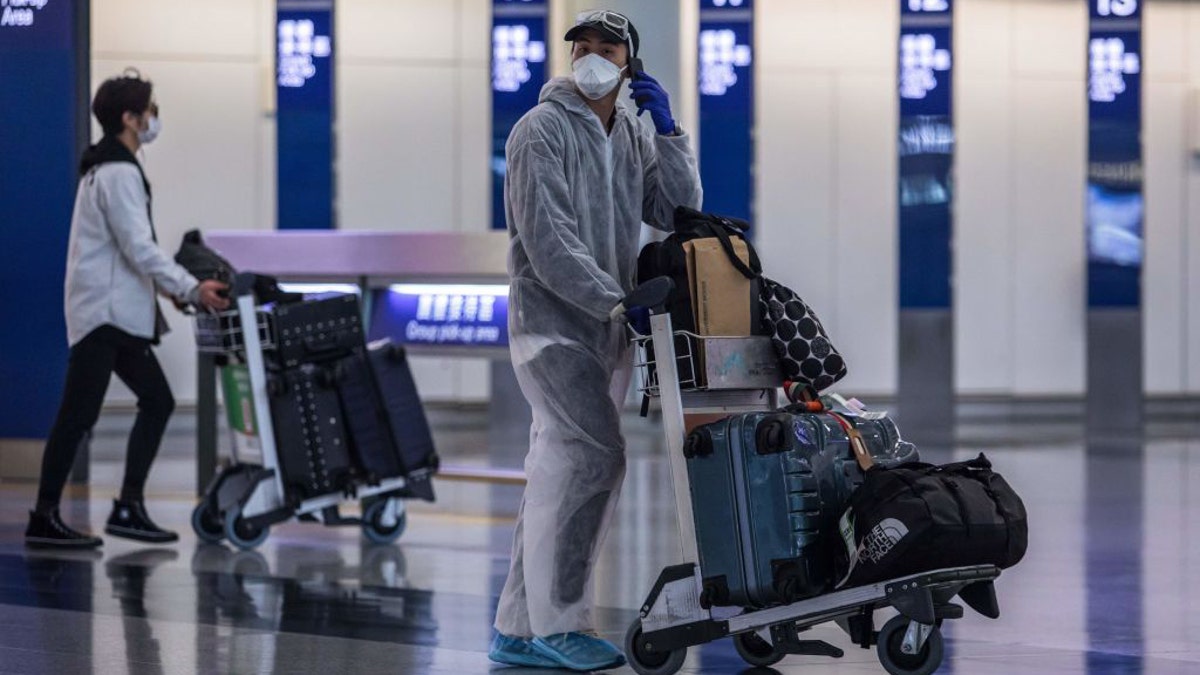Fox News Flash top headlines for April 9
Fox News Flash top headlines are here. Check out what's clicking on Foxnews.com.
Get all the latest news on coronavirus and more delivered daily to your inbox. Sign up here.
A new study says that despite stay-at-home measures being successful in flattening the curve of the coronavirus pandemic, any easing of restrictions could be counterintuitive prior to a vaccine being discovered.
"The first wave of COVID-19 outside of Hubei has abated because of aggressive non-pharmaceutical interventions," the researchers wrote in the study. "However, given the substantial risk of viral reintroduction, particularly from overseas importation, close monitoring of [reproduction number] and [confirmed case-fatality risk] is needed to inform strategies against a potential second wave to achieve an optimal balance between health and economic protection."
The research was published in the scientific journal The Lancet.

A passenger wearing a face mask and protective suit, amid concerns of the COVID-19 coronavirus, talks on his phone in the arrivals hall at Hong Kong International Airport on April 4, 2020. (Photo by DALE DE LA REY/AFP via Getty Images)
The reproduction number is the number of people that one person can infect, which the authors found has dropped from between two and three to "below [one]."
The confirmed case-fatality risk, also known as the case-fatality risk, is defined as the "proportion of deaths within a defined population of interest," measuring "the severity of the disease that causes death."
A similar study published last month said a "second wave" could come in China if social distancing was ended too soon in Wuhan.
The research, also published in The Lancet, notes that keeping the social distancing measures in place until early April could delay the "second wave" until early October. If the ban were lifted too soon, it could happen as soon as August.
China lifted the lockdown on Wuhan, a city with more than 11 million residents, on Wednesday. Fox News previously reported that travel restrictions were relaxed in the city.
Dr. Anthony Fauci, the director of the National Institute of Allergy and Infectious Diseases, recently told Fox News the decline in deaths can be attributed to social distancing, but that "you don't want to let up at a time that's premature."
He added that progress for a "safe" COVID-19 vaccine would take over one year. "The vaccine as I've been saying over the past several weeks, we got into a clinician trial faster than ever," Fauci said, adding a couple of other candidates are in phase 1 trials.
"It's going to take about a year to a year and a half," Fauci added. "In general, if you want to do it correctly, it takes about a year to a year and a half."
CLICK HERE FOR COMPLETE CORONAVIRUS COVERAGE
Currently, there is no known scientific cure for the disease known as COVID-19 that is ravaging the globe. There are, however, a multitude of different attempts to treat it, including various vaccines in different stages of testing.
Othe experimental measures, including drugs approved for other use cases and plasma transfusion from recovered COVID-19 patients, are also being researched.
As of Thursday morning, more than 1.49 million coronavirus cases had been diagnosed worldwide, including more than 432,000 in the U.S., the most impacted country in the world.









































